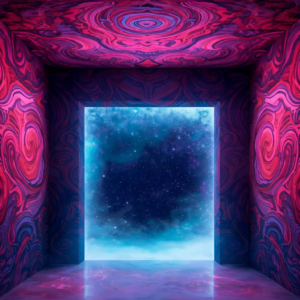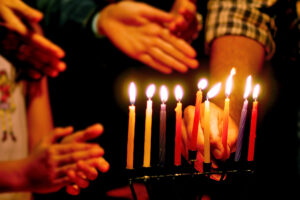Hashem, what are You waiting for???
We have no joy, no honesty, no strength, no hope. Redemption is no longer a luxury, Abba, it’s a matter of life or death! What are You waiting for???
Those who are familiar with my writing and my talks know that all my inspiration comes from Rebbe Nachman. As suggested by his name, Nachman, which in Hebrew means “consoler,” Rebbe Nachman is the master comforter, an elevated Tzaddik who during his lifetime displayed the most sublime self-sacrifice, for the singular purpose of reviving the Jewish People with words of consolation and strength.
I’ve been asked by readers and listeners how we’re even allowed to accept such messages of relief and solace. “Why,” they ask, “are Rebbe Nachman’s words so different from those of all his predecessors? Where does he take the authorization to offer words of acceptance, containment and relief, creating a space for everyone and shouting at the top of his lungs, “Gevalt, there is no such thing as despair!”
They’re paraphrasing what I once asked myself. Since childhood, I’ve been accustomed to a different message that encapsulates Judaism as rather harsh, frightening and demanding. What are his sources? Who said we’re allowed to talk a new way, and utter words that give us comfort?
* * *
Let’s say there’s a bochur – it should never happen to you or anyone you know – the son of one of the best families, who begins to show signs of restlessness. He starts to make subtle changes in his appearance — his clothes, glasses, hair. Gradually, he attracts new friends, learns new things, has new interests. There’s a lot of tension and worry in the house, punctuated by arguments, admonishments, maybe even shouting. There could be a harsh exchange of words, threats of punishment. Mommy cries and Tatty is angry. Doors slam.
And then, without warning, something happens and the bochur is in a life-threatening situation. This child, who is obviously confused and wavering, who has spoiled so many family dinners, is now … missing. A day passes, and another day, and another, and everyone is sick with worry.
“Why,” they ask, “are Rebbe Nachman’s words so different from those of all his predecessors?…
The blockage in the lines of communication between him and his parents disappears in an instant. The details that had previously taken front stage and center are suddenly rendered irrelevant. The anger has subsided, all the demands have faded away. The parents’ hearts are filled with just one thought: come back.
Come back, it doesn’t matter what or how. It does matter, it always matters, but in life-or-death situations, all else falls by the wayside. We’ll deal with the issues afterward – first, just come home.
Even if the whole world finds out about the boy’s disappearance — and let’s say it emerges that it was the result of foolish, thoughtless behavior. He hung out with a bad crowd and drank, smoke, used and lost himself for a few days, and with his return home, the story is publicized all over the world. People will remember it for years, it will shame the whole family, leaving an ugly, indelible stain, with all the consequences for future shidduchim. But the parents? Their entire, absolute desire is to see their son come home healthy and in one piece.
“Let him just come back,” they say and they weep. “Nothing else matters. We’ll deal with the humiliation, the shidduchim. The main thing is for him to come home. Alive.
* * *
In generations past, we were meant to live up to high expectations. Wrongdoing was censured, plain and simple.
But with the deepening of the Exile, the distancing has exacerbated an already untenable situation. In the descent of our latest generation, the battle is clearly one of life or death. Evil is prancing in the streets like it has nothing to lose. The end is near, and it knows it. And we are being targeted, physically and spiritually, with the last, most potent weapons in its arsenal. Jews are being swallowed up whole; if we’re not being drugged or assimilated or spurred to rebel against our Creator, we’re being poisoned constantly with sadness and depression. It’s the same plot from time immemorial: the Serpent who, then as today, infects us with its filth, making us exhausted and despairing, noticing only the bad and discounting the good, and presenting us with the sum total: You are bad, inadequate, worthless.
Those distant from Torah and mitzvos are cut off from Hashem due to external spiritual hazards. Those who are closer suffer from deep internal turmoil.
Rebbe Nachman scanned the generations from his time and until the era of Mashiach and announced, “We’re changing the strategy. The battle is intensifying. When our very existence is under threat, we no longer heed the minor details. Not that it doesn’t matter if we’re doing the right thing or not; it always mattered and it always will, but we can deal with everything and there’s nothing that can’t be fixed. Teshuvah works, always. If you believe that you can destroy, believe that you can repair – but first, live! Before anything else, be present. Bring yourself back from the internal severance, from your utter despair, from the horrible mistaken belief that you aren’t wanted and are no longer deserving.
Before anything else and with everything – just come, my child. Come back to your Father in Heaven.
* * *
And this, precisely, is the root of the terrible pain and confusion in the wake of the merciless blow that we as a community suffered last Monday. The deep despair is what hit us so strongly, and so painfully.
Even when we fulfill the Torah commandment, “Do not judge another until you reach his place,” and when we seal our ears and our eyes to all that is being said and written, whether for or against, for we were never assigned to be judges and were not commanded to judge – we still can’t ignore the incessant crying of our own hearts.
Because our hearts are crying— for the terrible loneliness, the utter hopelessness, for the incomparably excruciating feeling that All. Is. Lost.
And yet, for Hashem, there is never such thing as hopeless. There is no dead-end.
When I was a little girl, I remember thinking that the world was flat, like a table or a cliff, and that if we weren’t careful, we could simply fall off the edge. I think we all have, deep within us, a primordial, existential fear that if we make that one fateful mistake, or if we don’t refrain from the unthinkable, then the world will come to an end. Everything will stop. There is nothing after that.

I remember thinking that the world was flat, like a table or a cliff, and that if we weren’t careful, we could simply fall off the edge…
But Hashem created the world not as a flat surface, but as a sphere upon which we can all tread, thanks to gravity. And the message of our planet is clear: there is no edge to fall off of!
The Earth being round means that we can walk and walk and then walk some more. And if you’ve gone far, say the tzaddikim, once you’ve reached the most distant point, you are already beginning to come back. That’s the nature of a sphere; once you pass the most distant point, the path brings you back.
That, and only that, is what Yiddishkeit is all about. Mercy that is limitless; a path that never ends; teshuvah that can always effect a repair; a Creator Who is always close to every Jew, even one who fell or who was pushed into the deepest recesses and beyond.
Robbing us of that certain knowledge leaves us in the loneliest, most despairing place – the bloodiest Exile that we’ve ever experienced.
It’s possible that from Heaven we are being viewed with shock and horror, more with every passing day —and really, what can we say in our own defense?
Master of the world, our Father, You and all Your Heavenly Hosts, please look at us and see:
This is what a nation that has been exiled for 2,000 years looks like!
This is what children, after generations without a father, look like!
This is what the Jewish people, lacking a Beis Hamikdash and Mashiach for so long, look like!
Maybe this entire bitter Exile was just a kind of experiment meant to determine whether the Creator of the world, the Beis Hamikdash, or Mashiach are just recommendations or truly necessary. Well, the experiment can be stopped right now. The conclusions are clear: the Jewish People desperately need Mashiach. They desperately need the Beit Hamikdash. They desperately need closeness to Hashem.
Lacking those vital elements, the Jewish people literally have no existence. They lack the simplest form of identity. They have no joy, no honesty, no strength, no hope. Redemption is no longer a luxury, Abba, it’s a matter of life or death.
We lift our hands to You, no longer conceaing anything. No more denial or lying. We willfully turn ourselves in to You and beg You for protection and shelter.
We’ve succumbed to all the sins, we’ve made every possible mistake, we’ve died every death, spiritually and physically.
Never have we been as lost and sad and alone as we are on this day.
“Hurry, our beloved, for the time has come, and grace us as You did long ago.”
- 0 comment





















